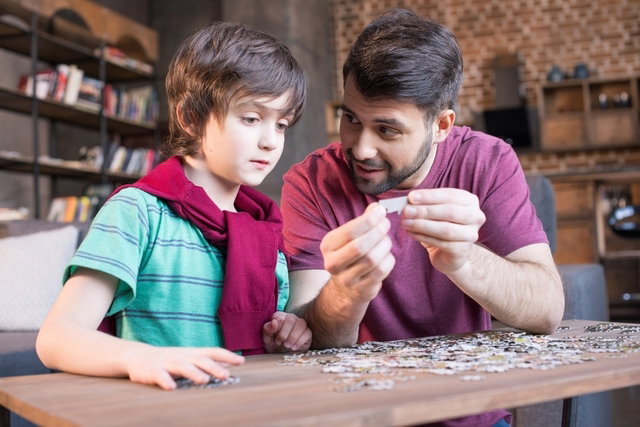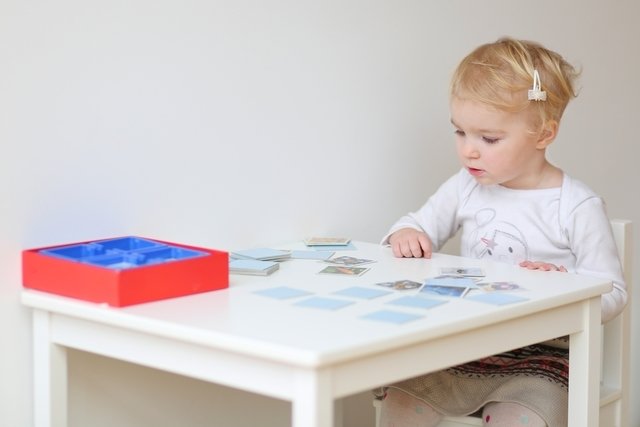Memory games, puzzles, error games and chess are activity options that can improve children’s ability to concentrate and pay attention. Most children, at some stage of their development, may have difficulty focusing on certain activities, which can even interfere with their development at school. Therefore, it is important to stimulate children’s concentration from an early age through games, for example.
Lack of attention can happen mainly when the child is tired or has been in front of the television or computer for a long time, being exposed to different stimuli. Therefore, in addition to playing, it is important that the child has adequate sleep for their age, as well as having a balanced diet and not having so many distractions at home.

1. Puzzle
Puzzles encourage children to look for logical solutions and look for details that can complement the pieces. Therefore, the child needs to pay attention to the small details present in each piece so that they can form the puzzle.
2. Mazes and dots
The maze game encourages children to look for a way out logically, stimulating not only reasoning, but also concentration. Connecting dots games also stimulate concentration in the same way, as the child needs to focus so that they can connect the dots correctly and thus form the image.
There is a method known as the Guillour method, which aims to encourage the carrying out of activities with lines and dashes in which the child performs the activity looking at the image of a mirror, this means that the child needs to have more concentration to perform the activity , in addition to stimulating spatial intelligence.
3. Game of mistakes
Error games make the child pay attention to two or more images and look for differences, this makes the child have more focus and concentration. It is interesting that the game is played at least twice a day so that attention and concentration on details and differences is stimulated more effectively.
4. Memory games
Memory games are great for stimulating a child’s concentration, as the child needs to pay attention to the images so that they know where the same images, numbers or colors are.
This game is interesting because, in addition to stimulating the child’s attention and concentration, it allows the child to develop social skills when the game takes place between two or more children.

5. Sorting things out
This type of play is interesting because it makes the child need to pay attention to the order so that they can then reproduce it. This game can be done by mixing objects and then encouraging the child to put them in the original order.
Furthermore, you can play the game “I went to the moon and took…”, in which the child must say an object and each time they say “I went to the moon” say the object they had already said and some other . For example: “I went to the moon and got hit with a ball”, then you should say “I went to the moon and got hit with a ball and a car”, and so on. This stimulates the child’s memory and makes them pay attention to what has already been said.
6. Chess
The game of chess requires a lot of reasoning and concentration, and is therefore an activity option to increase the child’s attention. Furthermore, chess promotes brain development and memory, stimulates creativity and the ability to solve problems.
What to do to make children pay attention to their parents
Teaching children to pay attention to what their parents say is not always an easy task, but there are certain strategies that can help, such as:
- Sit in a calm place with the child, facing him;
- Speak calmly to the child and looking him in the eyes;
- Tell the child what you want him to do in a few words and simplyfor example “Don’t slam the door” instead of “Don’t slam the door because it could be damaged and the neighbors will complain about the noise”;
- Give specific ordersfor example: “Don’t run in the house” instead of saying “Don’t do that”, when you see her running;
- Show the child what is the consequence If she does not comply with the order, if a “punishment” is imposed, it must be short-lived and possible to comply with – “if you continue running, you will sit for 5 minutes, without talking to anyone”. You shouldn’t make promises to children and not keep them, even if it’s a “punishment”;
- Praise the child whenever she fulfills an order.
Depending on the child’s age, parents must adapt the orders they want the child to follow.

Sign up for our newsletter and stay up to date with exclusive news
that can transform your routine!
Warning: Undefined array key "title" in /home/storelat/public_html/wp-content/plugins/link-whisper-premium/templates/frontend/related-posts.php on line 12
Warning: Undefined array key "title_tag" in /home/storelat/public_html/wp-content/plugins/link-whisper-premium/templates/frontend/related-posts.php on line 13




